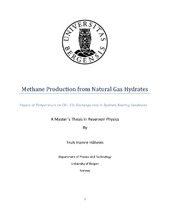| dc.description.abstract | Dissociation by pressure depletion, thermal stimulation and/or injection of inhibitors are three known methods for gas production from natural gas hydrates. Challenges concerning these production methods are water and sand production as well as a potential loss of geo-mechanical stability, which may cause subsidence and landslides. A fourth production scheme, studied in this thesis, is based on the exchange process taking place when methane hydrate is introduced to the more thermodynamically stable guest molecule carbon dioxide. Sequestration of CO2 in hydrate follows as an added benefit to released methane gas. This thesis investigates experimentally the impact of temperature on CH4-CO2 exchange within hydrate-bearing sandstone. All experiments have been conducted at the Department of Physics and Technology, University of Bergen. The experimental work performed covered three main procedures; 1) methane hydrate formation in consolidated sandstone cores, 2) exchange between methane stored in hydrate and injected liquid carbon dioxide, and 3) hydrate dissociation either by depressurization or thermal stimulation. Time and effort was used on improving the hydrate laboratory with regards to safety, more accurate measurements, and ease of use. To achieve this goal, new instruments and solutions were implemented, service on old equipment was carried out, and new tubing systems were implemented where needed. Methane hydrate was successfully formed in eleven Bentheim sandstone cores with similar initial water saturation (Swi=0.4) and brine salinity (0.1 wt%), providing equal initial conditions for the CH4-CO2 exchange process. Repetitiveness in post hydrate results were observed at equal initial properties. A consistent trend was also observed where increased initial water saturations (Swi>0.6) and increased salinity (3.5 wt%) resulted in a decrease in hydrate saturation when compared with earlier experimental results. Following the completed hydrate formation, six CH4-CO2 exchange experiments were conducted at two different temperatures (4° C and 9.6° C). Liquid carbon dioxide was injected into the core at a slow rate (1.2ml/h) and effluent, composition and mass were measured. A spontaneous exchange process was proven in several experiments, consequently producing methane from the solid hydrate and sequestrating carbon dioxide. Based on the experimental results there is a strong indication towards an increase in both exchange rate as well as total methane recovery with an increase in temperature, especially when close to the equilibrium line where the hydrate is less stable. A new approach of adding heat to the system was tested by co-injecting carbon dioxide with a potential catalyst for CH4-CO2 exchange; methyldiethanolamine (MDEA) or monoethanolamine (MEA). Injection of these liquids post pure CO2 injection and CH4-CO2 exchange showed no enhanced recovery of methane from hydrate. A modified setup was designed where MEA could be injected by a separate pump and therefore be introduced ahead of the carbon dioxide. A high methane recovery was observed at a high recovery rate. This was most likely due to melting of the hydrate which can be verified by observation of water in the production line. Dissociation of both pure and mixed hydrate (CH4 and CO2) by thermal stimulation with a stepwise increase in temperature showed different equilibrium temperatures. The mixed hydrate dissociated at a range of higher temperatures, compared to pure methane hydrate. This verifies presence of carbon dioxide and the increase in stability for a mixed hydrate where carbon dioxide is present. | en_US |
